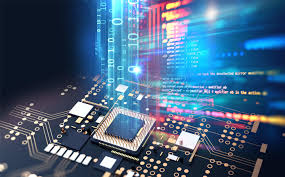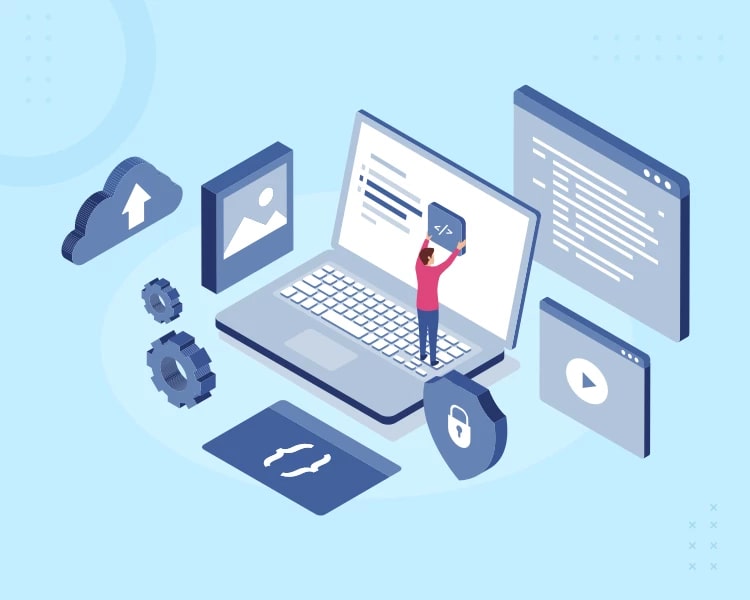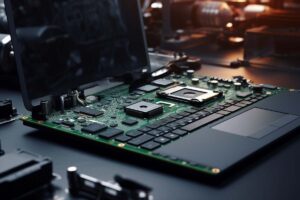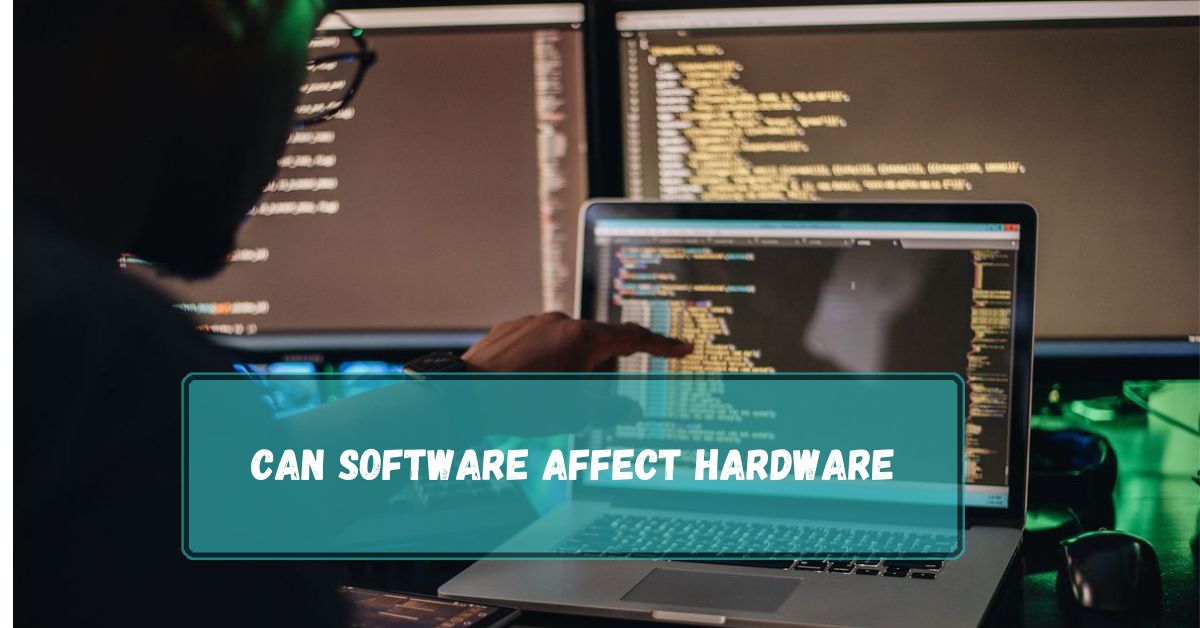In the rapidly evolving world of technology, understanding the intricate relationship between software and hardware is crucial. While hardware is the physical foundation of our devices, software acts as the invisible hand that guides their functionality.
Yes, software can affect hardware. Poorly written software or malware can cause hardware to overheat, slow down, or even fail. Regular updates and good security practices help protect your hardware and keep it running smoothly.
In this article, we will discuss “Can Software Affect Hardware?”.
Table of Contents
Understanding Software and Hardware:
1. What is Software?
Software refers to the programs and operating information used by a computer.
It’s categorized into system software, like operating systems (Windows, macOS, Linux), and application software, like word processors, games, and browsers. Software is essential as it provides the instructions that hardware follows to perform tasks.
2. What is Hardware?
Hardware comprises the physical components of a computer system, such as the CPU, RAM, hard drive, and motherboard. Each piece of hardware has a specific role, and together, they form the backbone of any computing device, providing the necessary resources for software to operate.
Interaction Between Software and Hardware:

1. The Basic Interaction:
At its core, software sends instructions to hardware, telling it what tasks to perform. This interaction is fundamental to computing-without software, hardware would be inert; without hardware, software would be useless.
2. Examples of Software-Hardware Interaction:
- Operating Systems: These are critical as they manage hardware resources, allowing other software to run.
- Drivers: Specialized programs that enable the operating system to communicate with hardware components.
- Applications: Software applications, like video games or editing programs, directly interact with hardware to deliver functionality.
Impact of Software on Hardware Performance:
1. Optimization Through Software:
Well-written software can significantly enhance hardware performance. For instance, optimizing code can reduce CPU usage, leading to smoother operation and less heat generation.
2. Software-induced Hardware Strain:
Conversely, poorly optimized software can strain hardware. Overclocking is a prime example, where software pushes hardware beyond its limits, potentially causing overheating and long-term damage.
High-demand applications, like modern games or video editing software, can also stress components if they are not adequately cooled or if the hardware is outdated.
Software Bugs and Hardware Failures:
1. Case Studies of Software Causing Hardware Issues:
There have been instances where software bugs have led to hardware failures. For example, a faulty update might cause a system to overheat by disabling cooling systems, or a software glitch could lead to excessive wear on a hard drive.
2. Preventive Measures:
To mitigate these risks, it’s essential to follow best practices such as keeping software updated, avoiding untrusted applications, and using reliable antivirus programs. Regular maintenance and monitoring can also help prevent software from adversely affecting hardware.
Read More: Memory Stick Encryption Software – Comprehensive Guide – 2024!
Firmware – The Middle Ground!
1. What is Firmware?
Firmware is a type of software that is embedded into hardware components. It provides low-level control for the device’s specific hardware.
2. Firmware’s Role in Hardware Management:
Firmware acts as a bridge between software and hardware, ensuring that hardware components operate correctly. It manages the hardware settings and controls the device’s behavior.
Software Updates and Hardware Longevity:
1. The Benefits of Regular Software Updates:
Updating software can lead to performance improvements, new features, and enhanced security, thereby potentially extending the life of hardware.
2. Potential Risks of Updates:
However, updates can also introduce compatibility issues or new bugs, which might negatively impact hardware performance. It’s important to verify the stability of updates before applying them.
Virtualization and Its Effect on Hardware:
1. Understanding Virtualization:
Virtualization allows one physical hardware platform to run multiple virtual machines, each with its own operating system and applications.
2. Impact on Physical Hardware:
While virtualization can maximize hardware utilization and efficiency, it can also lead to resource contention if not managed properly, potentially degrading performance.
Future Trends in Software-Hardware Interaction:

1. Emerging Technologies:
Technologies such as AI and quantum computing are reshaping the landscape of software-hardware interaction.
AI-driven software can optimize hardware usage in real-time, while quantum computing promises to revolutionize computational power.
2. Predictions for Future Developments:
As technology advances, the integration between software and hardware will become even more seamless, leading to more efficient, powerful, and intelligent systems.
Read More: How To Update Physx System Software? – Comprehensive Guide – 2024!
Does the software control the hardware?
Yes, software controls hardware by sending commands and managing how it works. It tells hardware what tasks to perform and how to operate, allowing users to interact with and use their devices.
What Are Three Other Differences Between Hardware And Software?
- Hardware is physical and can be touched, like a computer or keyboard.
- Software is digital and cannot be touched, like programs or apps.
- Hardware needs software to work, while software needs hardware to run.
What Is The Main Type Of Software You Have To Have To Make Your Computer Work?
The main type of software needed to make a computer work is the operating system. It manages all hardware and software functions, allowing you to run programs and use your computer effectively.
Does hardware depend on software?
Yes, hardware depends on software to work properly. Software provides instructions that let hardware perform tasks and operate correctly. Without software, hardware cannot function or be used effectively.
Is it possible to permanently damage the hardware by software?
No, software alone usually cannot permanently damage hardware. However, faulty software or malware can cause issues that might affect hardware over time. Keeping software updated and running security scans can help prevent problems.
Hardware damage caused by Software:
1. Overheating:
Faulty software can cause your hardware to overheat by overloading the CPU or GPU, leading to potential damage.
2. Corrupted Firmware:
Software bugs can corrupt the firmware of your hardware components, making them malfunction or become unusable.
3. Battery Drain:
Malicious or poorly designed software can drain your battery quickly, shortening its lifespan and causing long-term damage.
4. Hard Drive Wear:
Frequent or unnecessary read/write operations by software can wear out your hard drive over time, leading to data loss.
5. Performance Degradation:
Software issues can cause hardware to perform poorly, which may result in overheating or other forms of damage due to increased stress.
Can software hurt your hardware?
Yes, software can hurt your hardware if it causes overheating or forces it to run beyond safe limits. Viruses and malware might also damage hardware by corrupting critical files or changing essential settings.
Can Malware Permanently Damage Your PC?
Yes, malware can permanently damage your PC. It can corrupt important files, destroy data, or even make your PC unusable. In severe cases, you may need to replace damaged components or reinstall the operating system.
Can malware physically damage a computer?
Yes, malware can physically damage a computer. It can cause overheating, disable cooling systems, or change hardware settings, potentially leading to hardware failure. However, such cases are rare.
Can software damage hardware in PCs?
Yes, software can damage hardware in PCs. It can cause components to overheat, overwork, or malfunction by altering system settings or disabling cooling mechanisms, leading to potential hardware failure.
Can some software physically damage hardware?

Yes, some software can physically damage hardware. It can cause components to overheat, overwork, or malfunction by altering settings or disabling cooling systems, which can lead to hardware failure.
Can software physically damage hardware?
Yes, software can physically damage hardware. It can cause components to overheat or malfunction by changing settings or disabling cooling systems, leading to potential hardware failure.
Can a software update affect hardware?
Yes, a software update can affect hardware. It might cause compatibility issues, overheating, or malfunction by changing system settings or drivers, which could lead to hardware problems.
Can software damage a CPU?
Yes, software can damage a CPU. It can cause the CPU to overheat or overwork by running intensive tasks or disabling cooling systems, which can lead to hardware failure.
Read More: How To Remove Company Software From Laptop? – Comprehensive Guide – 2024!
Can software affect hardware in computer?
Yes, software can affect hardware in a computer. It can change settings, cause components to overheat, or make them work too hard, potentially leading to hardware issues or failure.
What happens when software is damaged?
When software is damaged, it can cause programs to crash, run slowly, or not open at all. This can lead to data loss, security issues, and reduced computer performance.
FAQs:
1. How can software damage hardware?
The software can damage hardware through excessive strain, such as overclocking or running high-demand applications without proper cooling.
2. What is the role of firmware in a computer system?
Firmware acts as an intermediary, providing low-level control over hardware components and ensuring they operate correctly.
3. Can software improve hardware performance?
Yes, optimized software can enhance hardware performance by reducing resource usage and improving efficiency.
4. What are some examples of software-hardware interaction?
Operating systems manage hardware resources, drivers enabling communication between OS and hardware, and applications utilizing hardware to perform tasks.
5. How can I ensure my hardware is not negatively impacted by software?
Keep software updated, avoid untrusted applications, use reliable antivirus programs, and monitor system performance regularly.
Conclusion:
Software can impact hardware in various ways, from improving performance to causing damage. Keeping your software updated and secure helps protect your hardware. Regular maintenance and caution with software choices ensure your hardware remains in good condition and functions efficiently.
